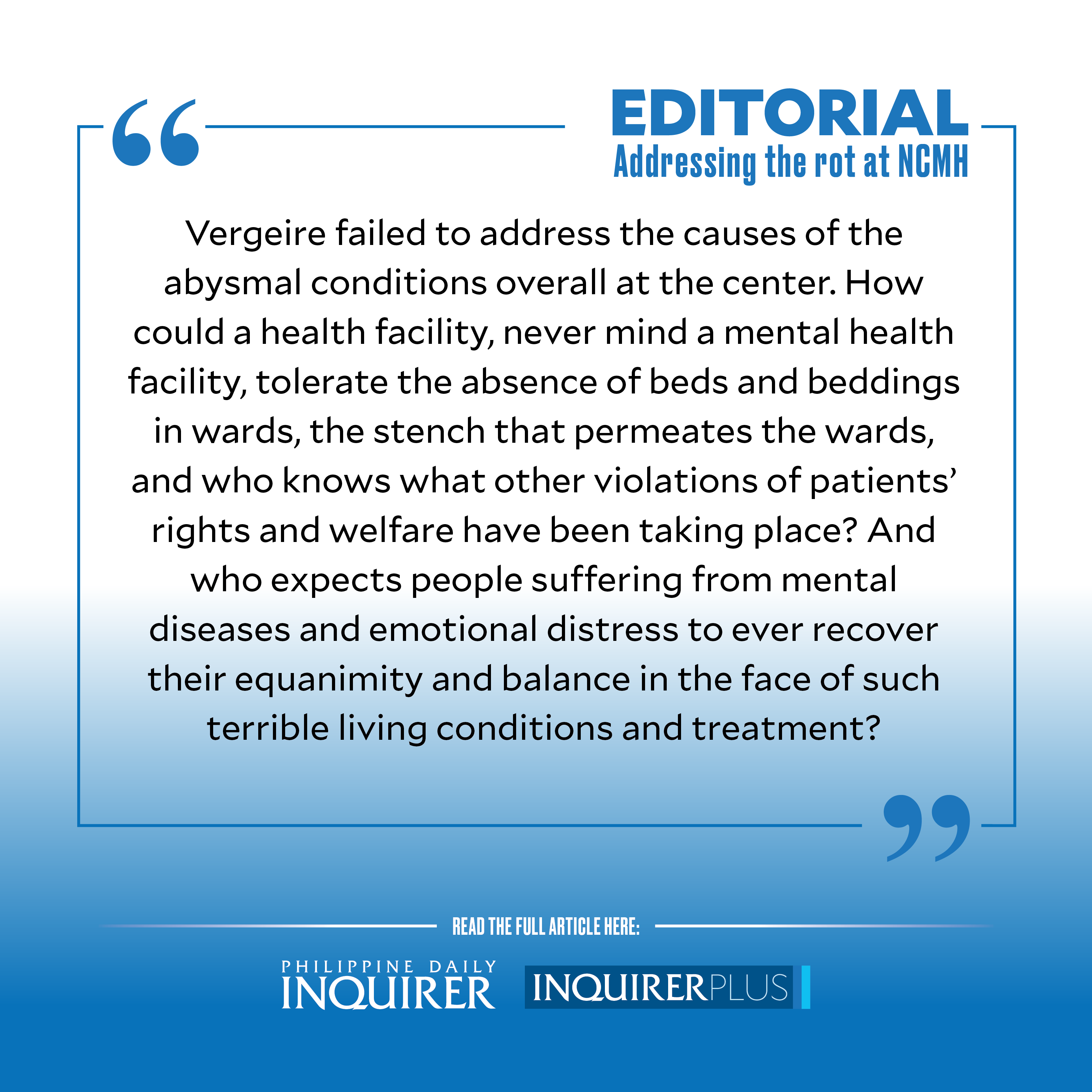Addressing the rot at NCMH

As the hoary joke goes, whenever someone mentions that he or she resides in Mandaluyong City, that person is immediately asked: “Sa loob o sa labas? (Inside or outside?)”
The joke refers of course to the National Mental Hospital which was formally opened in Mandaluyong in 1928 and has through the years been associated with the city. In 1986, it was thoughtfully renamed the National Center for Mental Health (NCMH) which, according to its website, is “a special training and research hospital mandated to render a comprehensive (preventive, promotive, curative, and rehabilitative) range of quality mental health services nationwide.”
That characterization, however, is belied by decades-long reports of abysmal conditions in the NCMH. Most recently, Sen. Raffy Tulfo paid a surprise visit (with media coverage) to the NCMH after receiving, he said, a tip from concerned netizens who said mental health patients in the facility were being maltreated, even “worse than animals.”
What the senator saw truly disgusted him, he said. He decried the conditions under which patients were made to live, saying that if one were of weak constitution, one would surely be nauseated by the awful odor inside a ward, “daig pa ang amoy ng kulungan ng baboy (worse than the stench of a pigsty).”
He observed that patients were made to sleep on bare floors, with no sleeping mats, blankets, or pillows. Patients were crammed into wards like sardines and such was the heat that it was comparable to an oven, with just a few electric fans to provide relief. He distinctly remembers dropping by Pavilion 8, the Female Ward, that “smelled of patients’ feces and urine, made worse by the stench of garbage dumped outside.”
As a result, Tulfo has filed a Senate resolution seeking to investigate the conditions at the NCMH, asking that the Senate committee on health conduct an inquiry on the conditions at the facility “to ensure that patients receive proper care and to address the reported corruption in [the center’s] management.”
So bad is the situation in the NCMH that its former chief administrative officer Clarita Avila exposed the dire situation of patients during the COVID-19 pandemic. Then NCMH chief Dr. Roland Cortez transferred Avila to another office and barred her from speaking on behalf of the hospital. Cortez had filed a case of graft and corruption against Avila about a year after he took office at NCMH. But in 2020, Cortez and his driver were gunned down by killers “riding in tandem.” Police subsequently filed murder charges against Avila and six other suspects.
But the rot at the country’s premier facility for mental health dates much further back than 2020 and apparently continues unabated to this day.
Department of Health officer-in-charge Dr. Rosario Vergeire said she is awaiting a Senate probe into the conditions at the NCMH, over which the DOH has supervisory powers, but clarified that Tulfo was only talking about one pavilion in the complex. Vergeire added that she is coordinating with the justice department to decongest the facility that holds patients facing criminal charges, and that the DOH is constructing an additional building to transfer patients from the more congested wards.Still, Vergeire failed to address the causes of the abysmal conditions overall at the center. How could a health facility, never mind a mental health facility, tolerate the absence of beds and beddings in wards, the stench that permeates the wards, and who knows what other violations of patients’ rights and welfare have been taking place?
And who expects people suffering from mental diseases and emotional distress to ever recover their equanimity and balance in the face of such terrible living conditions and treatment? In other countries, institutionalizing the mentally unbalanced seems to have fallen out of favor, with facilities shuttered and patients remanded to their families and to community health facilities. The results, sadly, have proven futile and exposed the rest of society to the criminal behavior of the mentally disturbed, as shown in the cases of anti-Asian hate crimes many of which were committed by people with a history of mental illness.
All this is taking place amid a more widespread mental health crisis, especially among young people, who are still trying to cope with the aftermath of loneliness, isolation, anxiety, and fear engendered primarily by the COVID-19 lockdowns and the stressors of today’s social media-soaked environment.Society cannot forever sweep these patients with mental health issues under the rug of public indifference and forgetfulness. Like it or not, we need to learn to live with them, address their health problems, and find solutions to integrate them into polite and compassionate society.
For more news about the novel coronavirus click here.
What you need to know about Coronavirus.
For more information on COVID-19, call the DOH Hotline: (02) 86517800 local 1149/1150.
The Inquirer Foundation supports our healthcare frontliners and is still accepting cash donations to be deposited at Banco de Oro (BDO) current account #007960018860 or donate through PayMaya using this link.




















